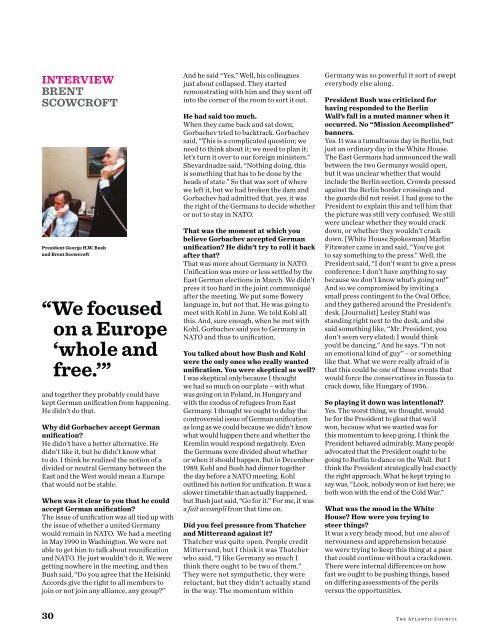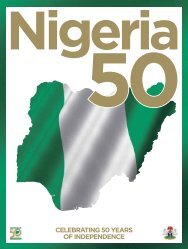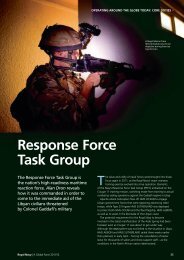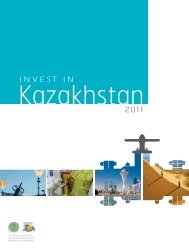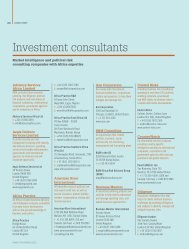NATO – A Bridge Across Time - Newsdesk Media
NATO – A Bridge Across Time - Newsdesk Media
NATO – A Bridge Across Time - Newsdesk Media
Create successful ePaper yourself
Turn your PDF publications into a flip-book with our unique Google optimized e-Paper software.
INTERVIEW<br />
BRENT<br />
SCOWCROFT<br />
President George H.W. Bush<br />
and Brent Scowcroft<br />
“We focused<br />
on a Europe<br />
‘whole and<br />
free.’”<br />
and together they probably could have<br />
kept German unification from happening.<br />
He didn’t do that.<br />
Why did Gorbachev accept German<br />
unification?<br />
He didn’t have a better alternative. He<br />
didn’t like it, but he didn’t know what<br />
to do. I think he realized the notion of a<br />
divided or neutral Germany between the<br />
East and the West would mean a Europe<br />
that would not be stable.<br />
When was it clear to you that he could<br />
accept German unification?<br />
The issue of unification was all tied up with<br />
the issue of whether a united Germany<br />
would remain in <strong>NATO</strong>. We had a meeting<br />
in May 1990 in Washington. We were not<br />
able to get him to talk about reunification<br />
and <strong>NATO</strong>. He just wouldn’t do it. We were<br />
getting nowhere in the meeting, and then<br />
Bush said, “Do you agree that the Helsinki<br />
Accords give the right to all members to<br />
join or not join any alliance, any group?”<br />
And he said “Yes.” Well, his colleagues<br />
just about collapsed. They started<br />
remonstrating with him and they went off<br />
into the corner of the room to sort it out.<br />
He had said too much.<br />
When they came back and sat down,<br />
Gorbachev tried to backtrack. Gorbachev<br />
said, “This is a complicated question; we<br />
need to think about it; we need to plan it;<br />
let’s turn it over to our foreign ministers.”<br />
Shevardnadze said, “Nothing doing, this<br />
is something that has to be done by the<br />
heads of state.” So that was sort of where<br />
we left it, but we had broken the dam and<br />
Gorbachev had admitted that, yes, it was<br />
the right of the Germans to decide whether<br />
or not to stay in <strong>NATO</strong>.<br />
That was the moment at which you<br />
believe Gorbachev accepted German<br />
unification? He didn’t try to roll it back<br />
after that?<br />
That was more about Germany in <strong>NATO</strong>.<br />
Unification was more or less settled by the<br />
East German elections in March. We didn’t<br />
press it too hard in the joint communiqué<br />
after the meeting. We put some flowery<br />
language in, but not that. He was going to<br />
meet with Kohl in June. We told Kohl all<br />
this. And, sure enough, when he met with<br />
Kohl, Gorbachev said yes to Germany in<br />
<strong>NATO</strong> and thus to unification.<br />
You talked about how Bush and Kohl<br />
were the only ones who really wanted<br />
unification. You were skeptical as well?<br />
I was skeptical only because I thought<br />
we had so much on our plate <strong>–</strong> with what<br />
was going on in Poland, in Hungary and<br />
with the exodus of refugees from East<br />
Germany. I thought we ought to delay the<br />
controversial issue of German unification<br />
as long as we could because we didn’t know<br />
what would happen there and whether the<br />
Kremlin would respond negatively. Even<br />
the Germans were divided about whether<br />
or when it should happen. But in December<br />
1989, Kohl and Bush had dinner together<br />
the day before a <strong>NATO</strong> meeting. Kohl<br />
outlined his notion for unification. It was a<br />
slower timetable than actually happened,<br />
but Bush just said, “Go for it.” For me, it was<br />
a fait accompli from that time on.<br />
Did you feel pressure from Thatcher<br />
and Mitterrand against it?<br />
Thatcher was quite open. People credit<br />
Mitterrand, but I think it was Thatcher<br />
who said, “I like Germany so much I<br />
think there ought to be two of them.”<br />
They were not sympathetic, they were<br />
reluctant, but they didn’t actually stand<br />
in the way. The momentum within<br />
Germany was so powerful it sort of swept<br />
everybody else along.<br />
President Bush was criticized for<br />
having responded to the Berlin<br />
Wall’s fall in a muted manner when it<br />
occurred. No “Mission Accomplished”<br />
banners.<br />
Yes. It was a tumultuous day in Berlin, but<br />
just an ordinary day in the White House.<br />
The East Germans had announced the wall<br />
between the two Germanys would open,<br />
but it was unclear whether that would<br />
include the Berlin section. Crowds pressed<br />
against the Berlin border crossings and<br />
the guards did not resist. I had gone to the<br />
President to explain this and tell him that<br />
the picture was still very confused. We still<br />
were unclear whether they would crack<br />
down, or whether they wouldn’t crack<br />
down. [White House Spokesman] Marlin<br />
Fitzwater came in and said, “You’ve got<br />
to say something to the press.” Well, the<br />
President said, “I don’t want to give a press<br />
conference; I don’t have anything to say<br />
because we don’t know what’s going on!”<br />
And so we compromised by inviting a<br />
small press contingent to the Oval Office,<br />
and they gathered around the President’s<br />
desk. [Journalist] Lesley Stahl was<br />
standing right next to the desk, and she<br />
said something like, “Mr. President, you<br />
don’t seem very elated; I would think<br />
you’d be dancing.” And he says, “I’m not<br />
an emotional kind of guy” <strong>–</strong> or something<br />
like that. What we were really afraid of is<br />
that this could be one of those events that<br />
would force the conservatives in Russia to<br />
crack down, like Hungary of 1956.<br />
So playing it down was intentional?<br />
Yes. The worst thing, we thought, would<br />
be for the President to gloat that we’d<br />
won, because what we wanted was for<br />
this momentum to keep going. I think the<br />
President behaved admirably. Many people<br />
advocated that the President ought to be<br />
going to Berlin to dance on the Wall. But I<br />
think the President strategically had exactly<br />
the right approach. What he kept trying to<br />
say was, “Look, nobody won or lost here; we<br />
both won with the end of the Cold War.”<br />
What was the mood in the White<br />
House? How were you trying to<br />
steer things?<br />
It was a very heady mood, but one also of<br />
nervousness and apprehension because<br />
we were trying to keep this thing at a pace<br />
that could continue without a crackdown.<br />
There were internal differences on how<br />
fast we ought to be pushing things, based<br />
on differing assessments of the perils<br />
versus the opportunities.<br />
30 The Atlantic Council


